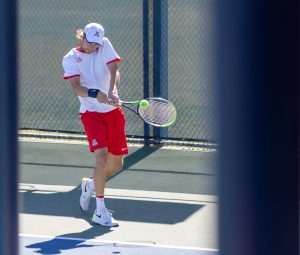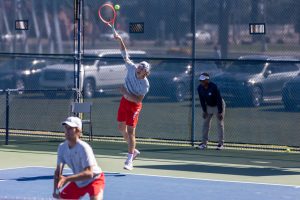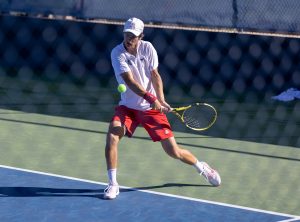- Slug: Sports-Arizona Tennis COVID Complications, 1,088 words.
- 4 photos available
By Ryan Schwager
Cronkite News
TUCSON — The Arizona Wildcats’ 19th-ranked men’s tennis team is a global operation, with seven international players on an 11-man roster. It’s a circumstance that can create a variety of challenges during a global pandemic.
For athletes born and competing in the United States, it might be hard to imagine what it is like for those from other countries competing at U.S. colleges during these times. Arizona’s tennis roster includes three players from Sweden, two from Canada, one from Norway and another from Japan.
Most have been unable to spend much time with their families or see friends because of COVID-19 protocols, which can vary dramatically from one country to the next.
“My mom can’t even come to visit and watch me,” Norway’s Herman Hoeyeraal said. “So, yeah, it’s kinda tough.”
Canadians Jared Horwood and Nick Lagaev have been adjusting to Canada’s strict pandemic policies for two years and said that the most important thing for them to remember is to try to make the best of the situation.
“You’re stuck in one place for a long period of time, and you don’t know what’s going on,” Horwood said. “You’re forced to take it one day at a time and make the best of what you’ve got.”
Lagaev agreed.
“It’s been pretty tough, especially in Canada with all the lockdowns we’ve been facing and what not,” he said. “We’ve both missed the game for so long. Jared and I weren’t allowed to play tennis for a couple of months, really. It really made us appreciate the game when we get to play and how fortunate we are to be able to come out, train, and put in all the effort that we can here in Arizona.”
Canada’s travel policies during the COVID-19 have been everchanging, but currently for anyone entering the country they include testing upon arrival and having a 14-day quarantine plan in place prior to arrival. Students are required to present a valid student permit, which is different from a typical student visa. On top of that, vaccinations are mandatory and an officer from the Canadian Border Services Agency can veto a person’s eligibility on the spot.
And it is just as difficult when their family members are trying to travel the other way across the border. Arizona’s spring season is underway and Horwood and Lagaev don’t expect to have many visitors from home.
“I was fortunate enough to have my parents come twice,” said Horwood, whose father also played tennis for the Wildcats. “I’ve been lucky to see them, but they have to balance a lot to be able to do that. So they don’t do it much.”
Lagaev has seen even less of his parents.
“My family has not been that fortunate to come much,” Lagaev said. “But, (my mom, my dad, and my sister) were here for Christmas one time. But the pandemic has been tough. Travel restrictions are pretty brutal. Jared and I have had to quarantine after taking tests when traveling up there many times. It definitely hasn’t been easy.”
Lagaev said that he and Horwood’s most recent quarantine did not end until January 31, causing them to miss a handful of matches before they participated in the squad’s recent pair of 7-0 victories in a doubleheader against Northern Arizona.
“It’s still a real thing back home, so it’s something we always have to think about,” Lagaev said. “But, hey, we’ve got to make it work.”
Horwood added, “Especially because everywhere we go, it seems like rules are different.”
“In Sweden, where I’m from, there haven’t been too many restrictions,” said Ziverts, who is currently ranked 73rd in the most recent ITA singles rankings. “When I was back home, I could still practice as much as I wanted to. Obviously, it was harder to travel around Europe to play in tournaments.”
Hoeyeraal, who was once the top-ranked prospect in Norway, agreed that even moving through Europe is a challenge.
“Right now, you have to have a third dose to even enter the country, and it’s a lot of testing because of all the flights,” he said. “But since I have a student visa, it was a lot easier than what maybe some other people have to go through and put up with.”
Like their Canadian teammates, Ziverts and Hoeyeraal know that their families are not going to see them compete in person.
Despite coming from different parts of the world, and enduring different health and safety policies, all four said that playing tennis for the Wildcats gives them a sense of place.
“When you’re so far away from home, it’s very important to feel that this place is your second home,” Ziverts said. “From freshman year to this year, I’ve seen, and I believe, that coach (Clancy Shields) doesn’t just recruit good tennis players, but also good people. That’s really been a big part of why I’ve been enjoying my college experience, for sure.”
Hoeyeraal said the circumstances almost force athletes “to find your new family.”
“And that’s exactly what happened with me here at Arizona,” he said. “It’s very cool.”
Horwood has found the same connection.
“It’s just been unconditional support since I’ve been here,” he said. “This is my fourth year, (Lagaev’s) third, and every time we go home, we’re super excited to come back. Everything we’ve built here, as a culture and as a team, it’s something to look forward to, for sure. It’s like we have two families.”
While it presents problems, even the worldwide pandemic hasn’t stopped what Shields is building in Tucson.
And his players have found ways to manage the situation and cope. While the Wildcats’ international players might be college tennis stars, ultimately, they’re still college students, too.
FaceTime, Snapchat, and video games help them feel like their closest friends and family are right by their side.
“I’m a huge FaceTime guy,” Lagaev said with a smile. “I love talking on the phone.”
As the season goes on, the Wildcats tennis team hopes that travel restrictions and rules in their various home countries will ease soon. Their season ends in April, and the spring semester ends in early May, when those who have eligibility remaining will return home to relax and begin preparing for another season.
Meanwhile, Horwood said the Wildcats, wherever they may call home, all have to be one thing this season:
“Adaptable.”
For more stories from Cronkite News, visit cronkitenews.azpbs.org.



